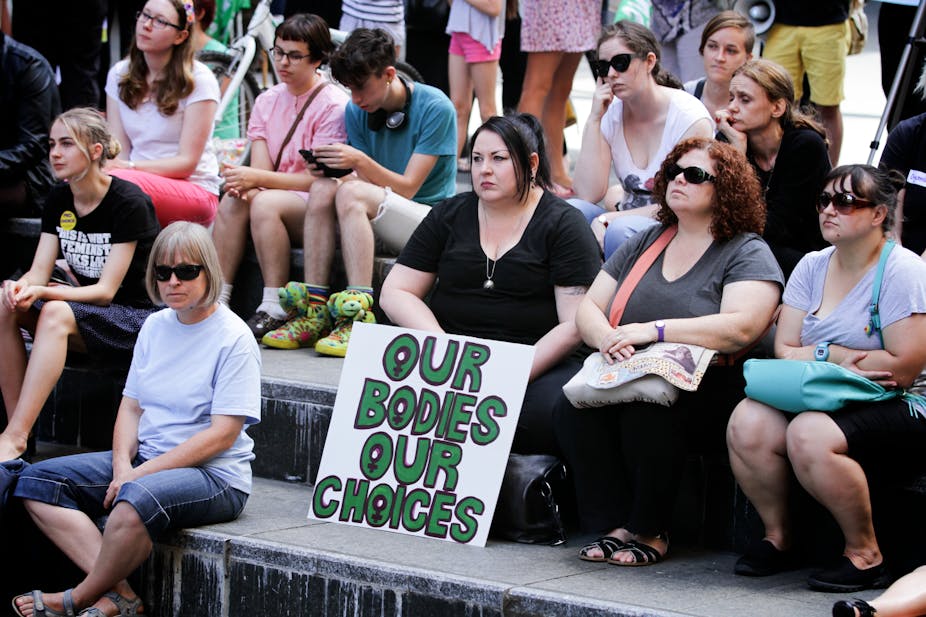A bill due to be debated in the upper house of the NSW Parliament will bestow legal personhood to fetuses of 20 weeks or more for the purpose of grievous bodily harm offences in the Crimes Act, if passed.
With the potential to erode women’s rights to autonomy, informed consent and liberty over pregnancy and childbirth decisions, “Zoe’s Law” takes the state into uncharted legal and medical territory.
Christian Democratic Party MP Fred Nile introduced the bill in the wake of the loss of Brodie Donegan’s unborn baby, Zoe. She was stillborn at 32 weeks when a drug-affected driver drove off the road and seriously injured her mother on Christmas Day 2009. The driver was charged only in relation to the harm caused to Brodie Donegan – and her loss – and the bill seeks to change that.
It was later revised and re-introduced as the Crimes Amendment (Zoe’s Law) Bill 2013 (No. 2) by independent MP Chris Spence, in whose constituency the Donegans live. The bill passed the lower house by a comfortable margin of 63 votes to 26 on November 21, 2013.
There is a risk that Zoe’s Law will affect the legality of abortion in New South Wales, one of only two Australian states where there has been no reform of abortion law. Terminating a pregnancy remains a criminal offence in the state under legislation from last century.
Zoe’s Law could provide ammunition to make abortion more difficult to obtain, but that is not the most significant matter at stake in this debate.
Why fetal personhood matters
If passed in the upper house, this would be the first time in Australia that a fetus is given separate legal status from its mother even though it remains within her body. The law would create a tension between a woman’s rights and those of her fetus.
The potential for conflict here is the basis of opposition to fetal personhood by Australian and American health professionals, including the New South Wales branch of the Australian Medical Association, the Public Health Association of America and the American Congress of Obstetricians and Gynaecologists.
These organisations have expressed concern about what such a law might mean for the autonomy and well-being of pregnant women, especially disadvantaged and vulnerable women.
Proponents of the bill say arguments that fetal personhood could be used to deprive women of their autonomy and liberty are scare tactics because the proposed law includes exceptions for actions done by or with the consent of the mother. But efforts to direct or curtail pregnant women’s behaviour in the interests of their fetus are not unknown.
A comprehensive survey of US cases in which pregnant women were deprived of their physical liberty because their behaviour might be considered a threat to the well-being of their fetus, for instance, found 413 cases between 1973 and 2005. The researchers thought they had underestimated the number of cases because it was difficult to identify them.
In 86% of the cases (354), women were charged with criminal offences, the majority (295) of which were punishable by more than one year in prison. As well as being arrested and jailed, they underwent forced medical interventions including caesarean sections, drug and alcohol treatments, and in-hospital detention for drug addiction or mental illness.
The authors note that, in most cases, efforts to deprive the women of their liberty “occurred through use of existing criminal statutes intended for other purposes”, and 71% involved disadvantaged, poor women. They conclude:
our findings confirm that if passed, personhood measures would not only provide a basis for recriminalising abortion but would also provide grounds for depriving pregnant women of their liberty.
Unintentional effects
Any law that raises the possibility of criminal liability for maternal choices that may be considered not ideal for the fetus, such as refusing a recommended medical intervention, is detrimental to women. It is also a challenge to public health because it fails to recognise and respect that women have the right to autonomy, bodily integrity and informed consent.
Criminalising and enforcing medical intervention for drug addiction and mental illness deters pregnant women with the conditions from seeking antenatal care, and may lead to worse health outcomes. Even though such approaches disproportionately affect vulnerable and disadvantaged women, proponents often fail to appreciate how they potentially increase health and social inequality.
The consequences of fetal personhood on women’s rights in pregnancy and childbirth, and for abortion, are uncertain. Clearly, only significant benefits can justify taking such serious risks.
Yet the New South Wales Bar Association is opposed to Zoe’s Law. In a letter to Chris Spence, it says it sees “no compelling need for the proposed change” and that the bill will “significantly change New South Wales law”. What’s more, it points to “legitimate concern about the broader implications of this Bill” in respect to other criminal laws in the state.
Lawyers, doctors and women’s groups all agree Zoe’s Law shouldn’t be supported. Why then are politicians so determined to reject their advice?

